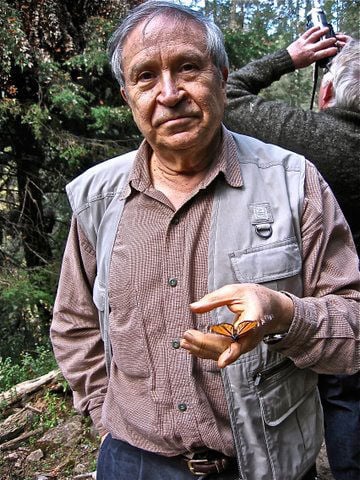Mexican poet Homero Aridjis wants to build a solar barrier between his country and the United States — and have the United States pay for it by selling electricity to customers in border cities.
Aridjis, an internationally known poet, novelist and environmental leader, said he has received overwhelming support for the Mexican-built barrier, first proposed by him and James Ramey in a December article on the Huffington Post website.
The article led to an invitation to speak at the University of Arizona during Earth Week later this month.
Aridjis, in a telephone interview from his home in Mexico City, said the article attracted 2 million readers and received 1 million “likes” on the online news site’s Facebook page.
There are very real problems along our shared border, said Aridjis, but a wall is not the solution to any of them.
“We have to try to find a solution because the wall exists already,” he said.
“We have to find a solution for the people and the environment and also for the economy.”
His proposal anticipates international investment in electricity-generating solar arrays, which he said could be built economically in Mexico, providing employment and increasing the skill level of the workforce.
Security would be provided by the power companies, who would want to control access to the facilities.
It would be a more people-friendly barrier — not one that physically and symbolically divides more than just two countries.
“One of the big problems with the Trump wall, as he has expressed it, is that it not only separates the U.S. and Mexico, but is also cutting in two the continent.”
“Consider history. Consider that the problems of today are not forever and we have changed this border in the past,” he said.
Aridjis concedes that his proposal is more vision than practical plan at the moment, but said, because he is “a writer and a Romanticist,” he needs to think it is possible.
“You have to be an optimist in the middle of the pessimism of the surrounding destruction,” he said.
Aridjis has turned his vision into reality in the past.
“I was born in a little village in Michoacan, which is the sanctuary of the Monarch butterflies,” he said.
Later in life, when he saw that sanctuary threatened, he formed the Group of 100, made up of prominent Latin American artists and intellectuals, and petitioned the government for help. In 1986. the group secured an order protecting the forest where the butterflies wintered.
The group had similar success protecting seven species of sea turtles and protecting whales. It also pressured the government to report air pollution levels in Mexico City and to phase out the use of leaded fuels.
“The Committee of 100 really shaped human-rights and environmental policy in Mexico,” said Gary Paul Nabhan, author and researcher on food and water security with the UA Southwest Center.
Nabhan, who invited Aridjis to the UA to speak, compared him to former Vice President Al Gore, noting that he has had more impact on environmental policy in his personal life than when he was part of the Mexican government.
Aridjis served in several diplomatic posts, including being ambassador to the Netherlands, Switzerland, and UNESCO. He also served six years as president of the international writers’ group, PEN.
Nabhan said Aridjis’ solar barrier proposal would face some of the same complaints from border residents as the wall does. “It’s nice, but symbolically, it’s still a wall,” he said.
“This is longshot stuff and it’s playfully a counterproposal, but it could really have some impact.”
If nothing else, it provokes debate, he said.
“At such a dynamic time, having a community dialogue about this is better than being frozen in our tracks with fear,” he said.
Aridjis said the border problems of crime, corruption and drugs affect Mexico far more than the United States. The two countries need to cooperate on solving those problems and the economic inequality that leads to immigration, he said.
“I think this wall is a terrible mistake,” he said.





